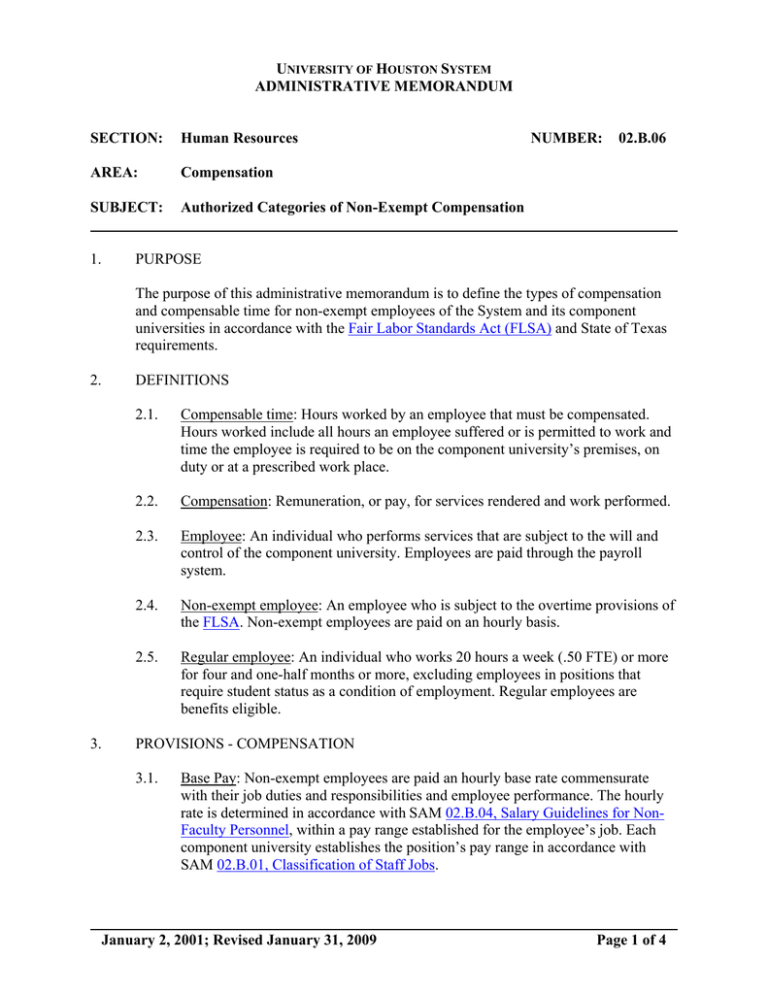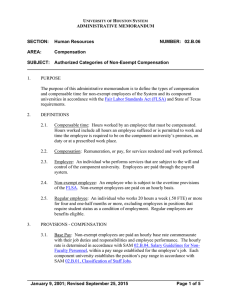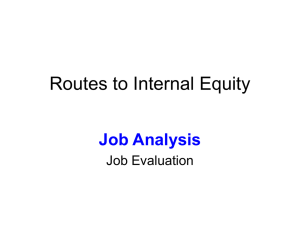U H S
advertisement

UNIVERSITY OF HOUSTON SYSTEM ADMINISTRATIVE MEMORANDUM SECTION: Human Resources AREA: Compensation SUBJECT: Authorized Categories of Non-Exempt Compensation 1. NUMBER: 02.B.06 PURPOSE The purpose of this administrative memorandum is to define the types of compensation and compensable time for non-exempt employees of the System and its component universities in accordance with the Fair Labor Standards Act (FLSA) and State of Texas requirements. 2. DEFINITIONS 3. 2.1. Compensable time: Hours worked by an employee that must be compensated. Hours worked include all hours an employee suffered or is permitted to work and time the employee is required to be on the component university’s premises, on duty or at a prescribed work place. 2.2. Compensation: Remuneration, or pay, for services rendered and work performed. 2.3. Employee: An individual who performs services that are subject to the will and control of the component university. Employees are paid through the payroll system. 2.4. Non-exempt employee: An employee who is subject to the overtime provisions of the FLSA. Non-exempt employees are paid on an hourly basis. 2.5. Regular employee: An individual who works 20 hours a week (.50 FTE) or more for four and one-half months or more, excluding employees in positions that require student status as a condition of employment. Regular employees are benefits eligible. PROVISIONS - COMPENSATION 3.1. Base Pay: Non-exempt employees are paid an hourly base rate commensurate with their job duties and responsibilities and employee performance. The hourly rate is determined in accordance with SAM 02.B.04, Salary Guidelines for NonFaculty Personnel, within a pay range established for the employee’s job. Each component university establishes the position’s pay range in accordance with SAM 02.B.01, Classification of Staff Jobs. January 2, 2001; Revised January 31, 2009 Page 1 of 4 AM No. 02.B.06 4. 3.2. Shift Differential Pay: Shift differential pay may be paid to regular non-exempt employees who work the evening and night shift SAM 02.B.10, Shift Differential, defines the evening and night shift and provisions for administering shift differential pay. 3.3. Hazardous Duty Pay: Regular employees who are commissioned peace officers of the System are eligible for hazardous duty pay. In accordance with Section 659.301 of the Texas Government Code, SAM 02.B.08 defines the provisions for administering hazardous duty pay. 3.4. Education Incentive Pay: Regular employees who are commissioned peace officers of the System may be eligible for education incentive pay. The police department at each component university may establish a program to pay commissioned police officers a monthly flat rate commensurate with their education level or T.C.L.E.O.S.E. (Texas Commission on Law Enforcement Officer Standards and Education) certificate. 3.5. Longevity Pay: Regular, full-time employees who have two or more years of service with the State of Texas are eligible for longevity pay. Employees who receive hazardous duty pay are not eligible for longevity pay with the exception of circumstances outlined in SAM 02.B.08. Eligible employees are paid $20 for every two years of lifetime service credit, in accordance with Section 659, Subchapter D of the Texas Government Code. SAM 02.C.01, Employee Benefits Program, defines the provisions for administering longevity pay. 3.6. Overtime Pay: Non-exempt employees are paid overtime pay for all hours worked in excess of 40 hours in a workweek in accordance with FLSA at a rate of time and one-half their hourly pay rate. Compensatory time at the rate of time and onehalf hours for each hour of overtime worked is granted in lieu of overtime pay unless the granting of compensatory time off is impractical. The hourly pay rate includes all types of pay the employee is eligible to receive prorated hourly. Paid leave and/or holidays are not considered time worked for purposes of computing overtime. SAM 02.B.02, Overtime and Compensatory Time, defines the workweek and provisions for administering overtime pay. 3.7. Student Worker Stipend: Must not exceed the reasonable approximation of the expenses incurred by the student workers involved in the program PROVISIONS – COMPENSABLE TIME 4.1. Standard Work Time: Hours worked by an employee, or available for work, during regularly scheduled work hours. January 2, 2001; Revised January 31, 2009 Page 2 of 4 AM No. 02.B.06 4.2. Break Periods: Periods of time that are generally 30 minutes or more when the employee is relieved from all duties and free to leave the component university’s premises are not compensable. Break periods of generally less than 30 minutes when the employee is available to perform work and on the component university’s premises are compensable time. 4.3. Meetings, Training Sessions, Conferences: Usually, time spent for meetings, training sessions, and/or conferences is considered compensable time. The following conditions must be met for meetings and/or training sessions to be considered non-compensable time: a. Attendance is outside the employee’s regular working hours, and b. Attendance is voluntary, and c. Employee is not required to perform any productive work while attending, and d. The program, lecture or meeting is not directly related to the employee’s job. If the training session teaches the employee a new job or new job skill and conditions a., b., and c. above are met, the time is considered non-compensable unless approved in advance by the employee’s supervisor. 4.4. Travel Time: Time spent traveling during the employee’s normal working hours, regardless or whether travel is during a workday or non-workday, is compensable. Time spent traveling outside of normal working hours is considered noncompensable time, provided the employee is not required to perform work while traveling. 4.5. On-Call Time/Beeper Duty: The time an employee is required to be on call by telephone, beeper, or other electronic device and available to return to the work site may be compensable. On-call duty restricts the employee from traveling outside the range of the electronic device provided the range includes the location of the employee’s residence and surrounding area. The employee must be provided a reasonable amount of time to respond to the call depending on the distance between the employee’s residence and the work site. 4.6. Call-Out Time: When an employee is called out to the work site after normal working hours or on a non-workday, the time the employee is at the work site is compensable time. The employee will be paid for a minimum of three hours if the actual hours worked is less than three. Travel time to the work site is not compensable. January 2, 2001; Revised January 31, 2009 Page 3 of 4 AM No. 02.B.06 5. 4.7. Medical Treatment: Time spent by an employee to receive medical treatment as a result of an on-the-job injury during normal working hours, on the day of the injury, is compensable time. 4.8. College Release Time: In accordance with the State Employees Training Act of 1969, full-time benefits-eligible employees may take up to three hours per week to attend college credit courses under the College Program. Hours spent attending class under the College Program are considered time worked, or compensable time. The employee’s supervisor must approve participation in the College Program prior to registration. REVIEW AND RESPONSIBILITY 6. Responsible Party: Associate Vice Chancellor for Finance Review: Every five years, on or before March 1 APPROVAL Approved: Carl P. Carlucci Executive Vice Chancellor for Administration and Finance Renu Khator Chancellor Date: June 9, 2009 January 2, 2001; Revised January 31, 2009 Page 4 of 4


